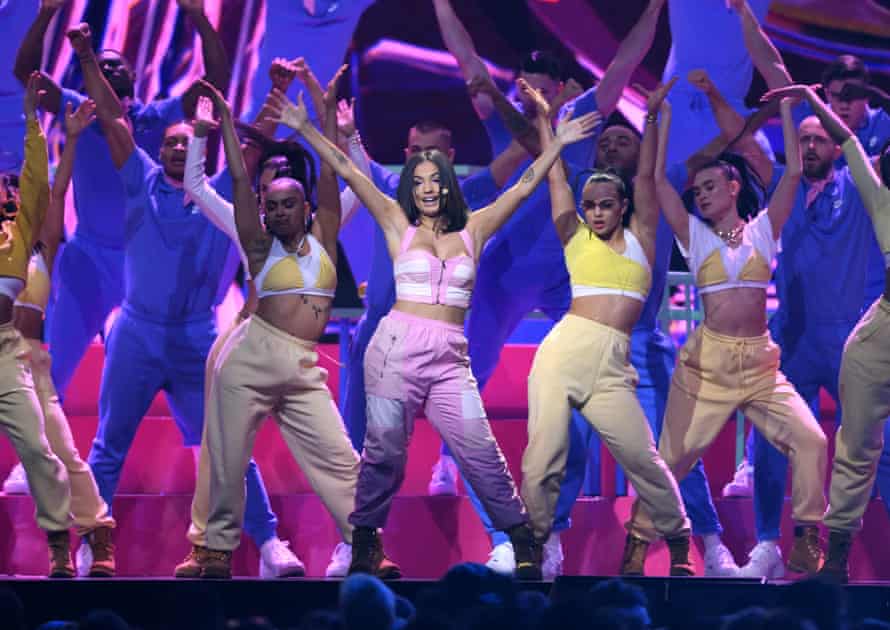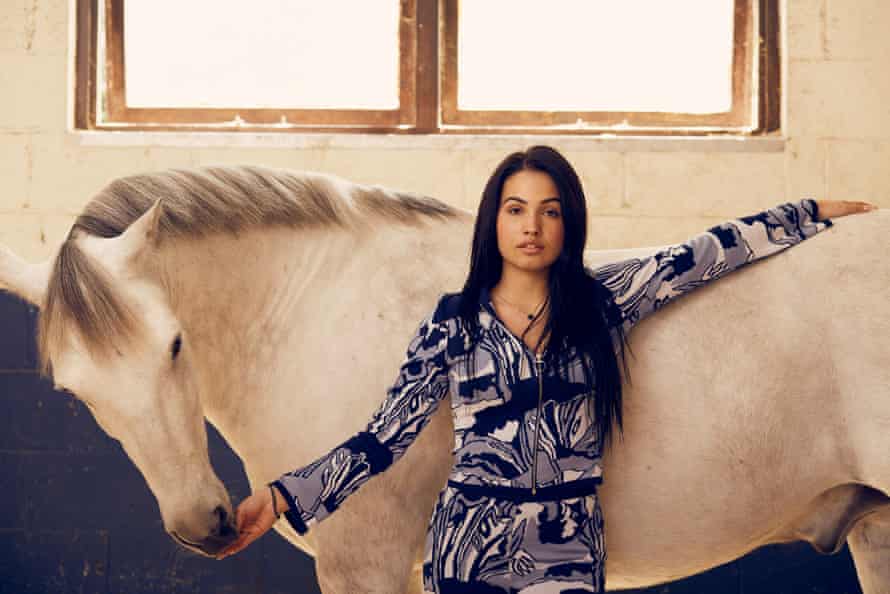
Mabel’s new house in north-west London is a work in progress. There’s a skip piled high in the front garden. Her mum, Neneh Cherry, answers the door and leads the way down a freshly painted hallway to the elegant chaos in the kitchen: visiting relatives dodge Ikea boxes and Mabel’s Italian greyhounds, sandy-coloured Tahini and silvery Imani, who has a cast on her front leg after a stairs mishap. Cherry takes Tahini and leaves Imani in her owner’s arms, swaddled in a blanket.
Everyone vanishes, leaving Mabel (Mabel Alabama-Pearl McVey, 26, second daughter to Cherry and producer Cameron McVey) sitting at her kitchen table, barefaced in a black vest and jeans. She has a warm assertiveness and a huge laugh, just like her mum’s. Her swish new home is the house that a heady pop ascent built: six Top 10, platinum-certified singles since 2019; a platinum debut album, High Expectations, that reached No 3; 12.5 million monthly Spotify listeners.
In 2020 she won the Brit award for best British female, positioning her as the next Dua Lipa, although Mabel occupied a different lane. She found her voice as a no-nonsense, sex-positive R&B singer, then became the first lady of the UK’s Afrobeats-influenced pop scene, and a dance belter who brought a raised eyebrow to the club womp of Jax Jones and Joel Corry. She once said she didn’t want to make music you needed a degree to enjoy. “Feeling like an outsider when I was younger makes me want everybody to feel welcome,” she says now, sounding sinusy from an immune condition.
The house and buzzing family environment (her godparents live next door) also represent Mabel establishing sturdier roots as she attempts all that again – with album two, the very good, very clubby About Last Night – albeit with a strictly healthier approach.
Pop stardom happened so quickly, “it’s like my soul didn’t catch up with my body”, she says. “I put out Don’t Call Me Up on 18 January 2018 and basically didn’t have a day off from then until the end of the year.” (Despite her brain-scrambling schedule, she has an acute memory for dates.) Mabel and her team were new to this kind of success, learning on the fly: sure it makes sense to fly to Australia for a 36-hour visit, then New York for 48. As the audiences multiplied, so did her lifelong anxiety and a new fear of failure. She started underperforming on purpose, “almost like if I stay in the safe zone of about 50%, there’s less chance bad things are going to happen and people are gonna hate me”.
‘It’s all I’ve ever wanted and now I’ve got it, I feel like I don’t deserve it.’ Mabel opens the 2020 Brits at the O2 in London, before winning an award. Photograph: Karwai Tang/WireImage
Inevitably, people noticed – little of her easy humour and intelligence came through – and she binged on the negative comments. “People telling me I’m what’s wrong with pop music,” she says. “I was getting messages telling me to do awful things to myself.” Maybe they were right, she thought: she didn’t deserve this success. Gripped by fear of letting everyone down, “I actually just ended up letting myself down.”
Growing up in Stockholm, Mabel wrote songs to calm her anxiety. What happens when your coping mechanism makes you anxious? The irony is even worse, she jokes. By 2019, “I was so busy I was hardly making music.” From the four days Mabel had in the studio that year, she felt painfully conscious that you’re “only as good as the last record”. Once a confident collaborator, now she questioned every note. “Too high? Too low? Too pop? Too Afrobeats, it’s not going to play on this radio station.” She sighs. “Exhausting.”
By December 2019, Mabel’s career was sparkling – Don’t Call Me Up was the year’s ninth biggest song in the UK – but her self-esteem had tanked. She went to the Maldives with an aunt and an “overflowing cup of negative thoughts about myself”. There she learned she was nominated for three Brits, up with Lewis Capaldi, Dave and Stormzy for the most nods. She wept. “I don’t think I’m crying because I’m happy,” she recalls. She flew home, determined to get herself together in the month before her headlining tour began, and she opened the Brits ceremony. By January, she was shut in her bedroom with the blinds down, holding her new dog, Imani.
While success was novel for Mabel’s immediate team, she was signed to Polydor, who are no slouches. How did nobody notice she was suffering? “We call it my mask,” she says with a sad laugh. “I wear it so nicely. I did everything with a smile on my face. I’ve never wanted to be that difficult artist.” She hid from the people who cared about her, ignoring her parents’ calls and cultivating hangers-on instead of friends. Whenever she saw her mum, “she’d be trying to look me in the eyes and be hurt, like: ‘Hello?’”
On 5 January 2020, Mabel surrendered and got a cab to her parents’ house in her pyjamas, Imani in tow. If she hadn’t asked for help then, she says, “I’m not entirely sure that I would be here. It was incredibly dark.”
‘We always say that I saved her,’ Mabel says to her dog: ‘But you saved me, didn’t you?’
A therapist said Mabel needed serious time off – but she was determined not to cancel anything. “I’m just gonna get through the Brits,” she recalls now, crumbling. “I’m sorry, I talk about it all the time and it never makes me cry.” Her parents came on tour, where she slept all day. “Those shows actually kept me alive. Just seeing that you haven’t disappointed people.”
She made it through her Brits performance, too, though she skipped the afterparties and went to bed clutching her award: tangible validation. Then she read an article saying FKA twigs should have won. Mabel loves twigs. “But I remember thinking, this is because I’m just that shitty little pop star and she does things with integrity.” She read more comments: about her performance, her dress, her body. Yet another one told her to kill herself. She was mortified and asked if she could return the award. “It’s all I’ve ever wanted and now I’ve got it, I feel like I don’t deserve it.”
Once her European tour ended in late February, Mabel intended to make a statement about online bullying and announce a break. This sort of story is becoming a galling pop norm. “Social media platforms need to take more responsibility,” she says. “It’s affecting people’s mental health in such a negative way.”
Ultimately the pandemic meant she never said anything: she was soon locked down with her family, doing therapy, taking medication, re-reading Harry Potter and walking their dogs. When life opened up, she rescued a horse, Gus, and committed to riding lessons for her mental wellbeing. “He had been in a field for nine months, nobody had ridden him, and he was so fat,” she says. “I love a reject. Imani was also a little reject. All the misfits, I’m like, come! Live with me!” Caring for animals helped her reframe self-care. “We always say that I saved her,” Mabel says to Imani: “but you saved me, didn’t you?”
Her manager asked if she could put Mabel in touch with Stormzy, sensing that he might have some wisdom. “He kept telling me, ‘Stats don’t lie, look at your plaques – nobody can tell you shit. Make music in the way you started making music. Just be free and enjoy it. And when you love things, just put them out. And then stay offline.’”
 ‘I’m feeding the person so that, when I go to be the artist, I’m good.’ Mabel with Gus at his stable. Photograph: Olivia Harris/The Guardian
‘I’m feeding the person so that, when I go to be the artist, I’m good.’ Mabel with Gus at his stable. Photograph: Olivia Harris/The Guardian
She got back to playing piano and self-producing. Gradually, thanks to suggestions from trusted collaborators, and confidence-renewing writing camps in Oxford and LA, About Last Night came together. It is a loosely conceptual record, with each song representing a moment at a house party: the wild bits, the sad bits, the reflective walk home. It was Mabel’s way of processing the previous two years, and also reconnecting with herself.
Growing up in Sweden, she didn’t embrace her Blackness until she moved to London. Still, as a light-skinned woman, she was hesitant to publicly foreground her identity. George Floyd’s murder changed her outlook. Frustrated by people Instagramming black squares, Mabel broke her social media hiatus to share a video and reading lists. “I’m white-passing, I’m incredibly privileged,” she says. “But I’m mixed-race, I have a Black mother, Black family. I’ve been nervous to speak out because I’m like, people are gonna come for me, but I thought, no: I have to do my part.”
She cites Whitney Houston and CeCe Peniston as influences on the album, hoping to affirm Black women’s importance to dance music history. She also drew from ballroom and voguing, reflecting her family ties to LGBTQ culture. Her godfather, the fashion designer Judy Blame, lived with the family throughout Mabel’s childhood: they would watch the voguing film Paris Is Burning together and go out for Malteasers when she didn’t feel up to school. She saw him the day before he died, in February 2018, but missed his funeral because of work, she says, tearing up. “Not having dealt with that, I started thinking about the things he taught me. I remember him saying that none of my female idols would be who they are without drag culture.”
She also wanted to highlight the joy of the era, creating a musical space for escapism during the pandemic. “The reason my parents got married was because they felt like the only time they and their friends were meeting up then was at funerals because of Aids,” she says. “And they wanted to celebrate life.”
Some kid will post something and it’s in the Top 10. But I worry about that kid and the pressure to deliver again
Whereas Mabel was “winging it” with High Expectations, she says About Last Night feels more intentional: “Doing all that work on myself put me in the driver’s seat in a different way.” But the reception has fallen short of her expectations. “I haven’t had the commercial success that I’ve had before, so far. That’s been quite difficult,” she admits.
Where she used to “moonwalk into the Top 10”, handbaggy lead single Let Them Know peaked at No 19, housey kiss-off Good Luck at 45. She’s noticed that when she Instagrams unmanicured photos – her dogs, her horse, her natural hair – her followers drop. “This can’t be the reality, that people bought into me because I wasn’t there,” she stresses. “I’m so excited to put this album out, but now that I’m really showing who I am, people don’t seem to think that’s good enough. So what do I need to do? Check out again?”
For a while she couldn’t listen to the new album, worried she had made a mistake. Then she realised she loved it, and that had to be enough. Plus, she says, the pop market has been “crazy” since the pandemic. “I’ve been quite sad about it. Everything feels so disposable. TikTok has given the power to kids, which I love – some kid will post something and then it’s in the Top 10. But I worry about that kid and the pressure of having to deliver again. I’m in my 20s and I still find that hard.”
She tells a story that she feels guilty about, though it only indicts the music industry’s apparent willingness to exploit young artists in the name of producing hits. When we discuss the allegations of sexual abuse against the DJ Tim Westwood, whom Cherry always told her to avoid, Mabel worries about having been complicit in a toxic culture. (Westwood denies the allegations.) “When I was younger, you go into studios with producers and I’d always be like, well, I’m not going to sleep with them, but I guess I should make them think that they could, so I can sit here and write the song.” I stress it isn’t her cross to bear. “It’s bad that so many of us have this sad acceptance of the world,” she shrugs.
Despite her severe experiences with social media, she still feels pressure to remain engaged. “I didn’t sign up to be a TikToker,” she says, echoing recent sentiments from Adele, FKA twigs and Florence Welch.
Polydor, Mabel adds, were blown away by her vision for About Last Night. And her confidence in it is convincing. She comes back to pop’s short-termism: she says more power to artists getting signed off TikTok, “but I’ve spent since 2015 working on my artistry, becoming an incredible performer, and I can say that with my chest. I used to be embarrassed to say those things. But that takes time, and a lot of work.”
She says she’s often had to fight for her seat at the table, “to sort of apologise for being up there with the guys. If you look at the stats, actually, I own the table in a lot of circumstances”.
Recognising her worth started with a reality check: she had been reading the comments, partying when she didn’t want to. (Mabel stayed sober throughout 2021.) She’s working on making real friends, and having a nice, non-famous boyfriend – following an array of disastrous “situationships” involving insecure rappers and guys with secret girlfriends and secret babies – helped her realise that she deserved someone kind.
There are new boundaries now: horse time blocked in the diary; better schedule management. “We’re taking care of ourselves,” she tells Imani: tomorrow they’re off to the vet for an X-ray. It’s working so far: Mabel was nervous, but not anxious about her recent performances. “I’ve done my therapy. I went to Gus. I’m feeding the person so that, when I go to be the artist, I’m good.”
Despite trying to be softer with herself, her ambitions remain the same: career longevity, a Grammy one day. “I want them now, I want them yesterday,” says Mabel. “But the artists who have those things have always been true to who they are. It might have happened the way I was doing it before, but I wouldn’t have enjoyed it.”
About Last Night is released on Polydor on 15 July.
Mabel did not ride Gus bareback at any point during the photoshoot: all images were posed.
In the UK, Samaritans can be contacted on 116 123 and the domestic abuse helpline is 0808 2000 247. In Australia, the crisis support service Lifeline is on 13 11 14 and the national family violence counselling service is on 1800 737 732. In the US, the suicide prevention lifeline is 1-800-273-8255 and the domestic violence hotline is 1-800-799-SAFE (7233). Other international helplines can be found via www.befrienders.org.
https://www.theguardian.com/music/2022/may/27/tiktoker-mabel-bullying-brits-animals-2019-pop-cruel-comments





